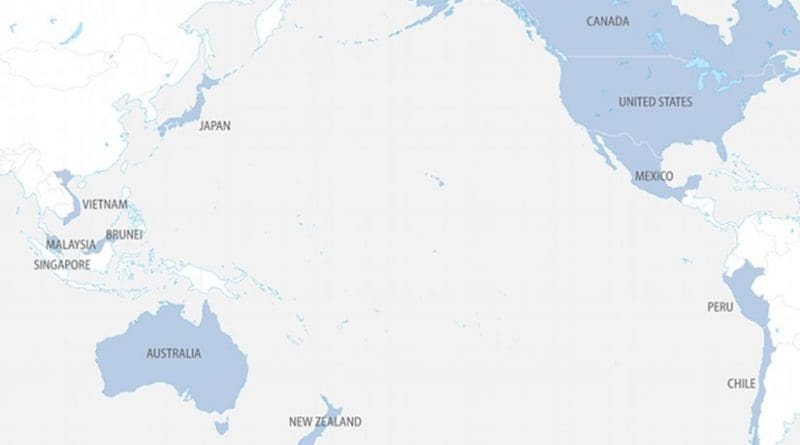Trans-Pacific Partnership (TPP), India And Asian Regionalism – Analysis
Though the Trans-Pacific Partnership is still the most ambitious of all plurilateral free trade agreements (FTAs), it is far from the ‘gold standard’ originally envisaged.
By Ram Upendra Das* and Nitya Batra**
Regionalism by way of bilateral and regional free trade agreements (FTAs / RTAs), as well as comprehensive economic partnership agreements has gained momentum in recent times. It has also displayed immense dynamism in terms of intra-regional economic linkages getting deepened and increased intra-regional trade shares accounting for total trade of the regional groupings, so much so that the world trading system is characterised by preferential trade rather than the ‘Most-favoured Nation (MFN)’ trade. Almost all countries are part of one or the other regional trading arrangements, and in many instances multiple arrangements.
This “regionalism renaissance” coincides with the evolution of the multilateral trading system through multilateral trade negotiations, including the WTO Doha work programme. Multilateralism and regionalism can coexist, as such arrangements are allowed in the erstwhile GATT Article XXIV; Enabling Clause and Article V of the GATS, applicable to WTO.
The composition of RTAs is changing. The arrangements have moved beyond geographically described traditional zones to cover countries across different regions and continents. The one such regional trade arrangement that has been in headline recently is the Trans-Pacific Partnership (TPP). It took more than five years when the trade ministers from the 12 participating Asia-Pacific countries met in Atlanta and finally concluded the negotiations surrounding the TPP on October 5, 2015. Reports suggest that there is a lot that needs to be done before that happens by way of ratification of the agreements, and there is no certainty that it will happen in very near future. So the non-member countries need not press the panic button, as the TPP has not arrived as yet.
The TPP may pride itself as being the most progressive agreement ever because it explicitly deals with additional issues such as labour and environment standards. Though TPP is still the most ambitious of all plurilateral free trade agreements (FTAs), it is far from the ‘gold standard’ originally envisaged. Even when it comes to the most basic of reforms – tariff liberalization – there are some inordinately long implementation periods. For instance, the current 2.5 per cent tariff on imported Japanese cars to the US will take 15 years to go down to 2.25 percent and a further 10 years to go down to zero. Reportedly, for trucks, the US has no gradual phase-out, with the full 25 percent tariff staying in place until its elimination in 30 years. The special safeguard between the two countries in automobile sector can be applied during the “transition period,” which is defined as the period between entry into force and ten years after the tariff is eliminated. This is too stringent and can be captioned as reverse Special and Differential Treatment. With regard to the rules of origin, reports suggest that the Mexican and Canadian governments reject the rules of origin in the TPP, citing unacceptably low regional value content threshold than the one US, Mexican and Canadian industries proposed to their governments, apprehending that they will deter investment in the region.
It has widely been covered in press as to how TPP is being driven by large transnational corporations. There are fears of it favoring investors’ interests while eroding national sovereignty and interests of individual consumers and even nations. This suggests global action for individual or corporate level welfare. In contrast to this, ethos must be to ensure individual action aimed at global welfare.
It is in this sense that the Regional Comprehensive Economic Partnership (RCEP) could prove to be a model regional cooperation agreement, ensuring that the weaknesses of the TPP agreement do not spill into its negotiation process. This could happen if the RCEP includes trade in goods, trade in services and investment in a comprehensive manner but does not include IPRs, Competition policy, labour and environmental standards. These could be left to countries to upgrade in consonance with their respective stage of development.
The subject of joining or not joining TPP has been a debatable issue. A study by Peterson Institute for International Economics shows that if China and the rest of the Asia-Pacific Economic Cooperation (APEC) forum join a second stage of the TPP that continues to exclude India, India’s annual export losses will approach $50 billion. By contrast, India could experience huge export gains of more than $500 billion per year from joining an expanded TPP or participating in a comprehensive Free Trade Area of the Asia Pacific (FTAAP), now being considered by the APEC.
Looking at different possibilities of welfare and trade gains our estimates suggest that out of the various scenarios of TPP with or without India and RCEP with or without India, maximum economic gains accrue from RCEP which includes India. If India puts its weight in RCEP, this may be economically more welfare enhancing as compared to TPP. So, it’s not much of a loss if we don’t join TPP as South Korea and China are also not a part of it and are members in RCEP.
India could also supplement its strategy of supporting the RCEP, which is potentially the biggest mega-grouping, by increasing its investment-presence in the Cambodia, Laos, Myanmar Vietnam (CLMV) region, whereby it can access the TPP market via Vietnam and the rest of dynamic TPP members via the RCEP.
Thus, the focus on what India is missing from not being a member of TPP is a partial approach towards the overall picture. By not having India in TPP, the grouping also misses something that India could have brought being a member. Also, since RCEP is open to all, we can think of inviting US and Russia to the RCEP process, to make the Asian economic regionalism, a process which is truly inclusive.
* Professor and **Researcher, respectively at RIS, New Delhi. Views are personal.

